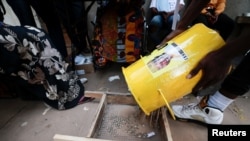Gambian police fired tear gas on Monday to disperse supporters of losing presidential candidate Ousainou Darboe as they took to the streets outside the capital Banjul to contest the re-election of President Adama Barrow.
Hundreds of protesters had gathered in the community of Serekunda, 12 kilometers (7 miles) from Banjul, the day after Darboe and two other candidates said they would not accept Barrow’s resounding win in Saturday’s peaceful voting.
Police intervened with tear gas when the crowd started scuffling with supporters of Barrow, according to a Reuters reporter at the scene.
Later on, Monday, police broke up another protest of Darboe supporters near his house in Serekunda using tear gas. A witness saw some police beating protesters, before the crowd dispersed.
The office of the Inspector General of Police said it was concerned about gatherings turning violent.
“Without restraint, any form of post-electoral violence will jeopardize our legacy for tolerance, maturity and peacefulness. This Office therefore, strongly urges all Gambians to remain calm,” a police statement said.
The election is a test of stability and democratic progress in the tiny West African country of 2.5 million people. They hope it will help draw a line under the oppressive 22-year rule of former president Yahya Jammeh, who lost to Barrow in 2016 and was forced into exile.
Earlier on Monday, Essa Mbye Faal accepted defeat, backtracking from his earlier announcement that he would reject the results because of alleged problems at polling stations and other issues.
“I have called Adama Barrow for his electoral victory,” he said, without explaining his change of heart. “I told my supporters that we have lost the elections and we should accept the will of God.”
The two remaining hold-out candidates have not said how they will proceed. They have cited allegations of problems at polling stations and other issues and said on Sunday that “all actions are on the table.”
Election observers from the African Union said the election was conducted in line with international standards, while EU observers praised the transparency of the voting and counting process.
However, in its statement, the EU observer mission criticized the Independent Electoral Commission, saying its pre-election candidate acceptance process was overly opaque.





